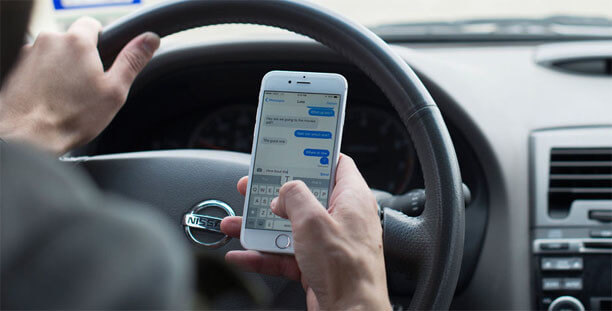
Distracted driving laws are tightening across the nation, and Washington State is no exception. With the Driving Under the Influence of Electronics (E-DUI) law, drivers face stiff penalties for using handheld devices behind the wheel—whether they’re driving, stopped at a red light, or stuck in traffic. This law isn’t just about fines; it’s about saving lives. Here’s everything you need to know about Washington’s E-DUI law, its penalties, and why compliance is critical.
No Handheld Cell Phone Use While Driving
The E-DUI law prohibits the use of handheld electronic devices while driving, including:
- Using your phone while stopped in traffic or at a red light: You’re still considered “driving” even when your vehicle isn’t moving.
- Typing messages or accessing information: Sending texts, reading emails, or even searching for information on your phone is illegal.
- Watching videos or using cameras: Scrolling through TikTok, watching YouTube videos, or taking selfies while in the driver’s seat are violations under the law.
What Will an E-DUI Cost You?
Getting an E-DUI can lead to significant financial consequences:
- First offense: A $136 fine.
- Second offense (within five years): A $234 fine.
Beyond the fines, an E-DUI is reported to your insurance company, likely resulting in a spike in your insurance premiums. Over time, this could cost you hundreds—or even thousands—of dollars more in premiums. The financial hit is substantial, but the risks of distracted driving can be far worse.
Exceptions to the Rule: When Can You Use Your Phone?
The law allows for limited phone use under specific circumstances:
- Hands-free use: Devices connected via Bluetooth or similar systems are permitted, as long as you can operate them with a single touch or swipe without holding the phone.
- Parked or out of the flow of traffic: If you pull over to a safe, legal location and put your car in park, you’re free to use your device.
- Starting GPS or music: Set up your navigation or music playlist before you begin driving.
- Contacting emergency services: Calling 911 or other emergency services during a crisis is always allowed.
Planning ahead and utilizing hands-free technology can help you comply with the law while staying connected.
The Danger of “Other” Distractions
While cell phone use is the primary focus of the E-DUI law, it’s not the only form of distraction that could land you a ticket. The law also allows officers to issue a $99 fine for dangerously distracted driving if:
- Other activities interfere with your ability to drive safely, such as eating, grooming, smoking, or reading.
- You’re pulled over for a primary offense, such as speeding or failing to signal, and the officer notices your distracted behavior.
Even activities that seem harmless can impair your reaction time and decision-making behind the wheel, putting you and others at risk.
Why Was the E-DUI Law Implemented?
The statistics are staggering:
- Distracted driving fatalities increased by 32% from 2014 to 2015 in Washington.
- 71% of distracted drivers admit to using their phones while driving, the most dangerous form of distraction.
- One in four crashes involves cell phone use just before the collision.
Distracted driving is a leading cause of preventable road deaths. The E-DUI law was introduced to address these alarming trends, encouraging safer driving habits and reducing the number of crashes caused by inattention.
How the E-DUI Law Works
The E-DUI law empowers law enforcement to issue tickets to drivers visibly using handheld devices. Police can pull you over for this violation alone—it’s considered a primary offense.
For example, if an officer sees you texting at a red light, that’s enough to issue a ticket. They don’t need to suspect you of speeding or committing another violation first.
What Happens If You Break the E-DUI Law?
Beyond the fines and potential insurance increases, an E-DUI ticket creates a public record of your driving behavior. Multiple violations could affect your driving record, making you a higher-risk driver in the eyes of insurers and employers.
But the consequences aren’t just financial. Distracted driving increases the likelihood of accidents, injuries, and fatalities, putting your life—and the lives of others—at risk.
Tips to Stay Compliant
Avoiding an E-DUI ticket is easier than you might think. Here are some practical tips:
- Set up your device before driving: Program your GPS, select your playlist, and respond to any messages before you start the car.
- Invest in hands-free technology: Bluetooth-enabled devices, dashboard mounts, and voice commands can help you stay connected without breaking the law.
- Use “Do Not Disturb” mode: Many smartphones offer this feature to silence notifications and block incoming calls while driving.
- Pull over safely: If you must use your phone, find a safe spot to park before reaching for your device.
The Bigger Picture: Preventing Distracted Driving
The E-DUI law is part of a broader effort to make Washington’s roads safer. Distracted driving isn’t just about fines—it’s about preventing the devastating consequences of accidents caused by inattention.
Every time you take your eyes off the road, even for a few seconds, you’re putting yourself and others at risk. Staying focused behind the wheel isn’t just a legal requirement—it’s a responsibility.
To read the actual language of the law, click here: RCW 46.61.668


